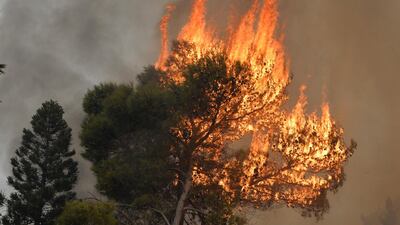Pockets of wildfires continued to rage across Lebanon on Wednesday morning despite brief showers the night before.
The worst blaze in more than a decade has burnt for three days, destroying homes, shops, forests and crops.
In the Chouf region, a large forested area south-east of Beirut, high winds reignited fires at dawn despite civil defence volunteers, security forces and locals fighting late into the night to extinguish them, the state-run National News Agency reported. New forest fires were also reported to have started on Wednesday morning in the regions of Jbeil and Akkar, in the north of the country.
Cypriot, Greek and Jordanian firefighting planes flew to Lebanon on Tuesday to assist the Lebanese army in water-bombing over a hundred fires. Flames reached 25 metres high, said George Mitri, director of land and natural resources at the University of Balamand.
Lebanon has been struggling to contain wildfires since Monday morning that have been exacerbated by strong winds and unusually high temperatures for the season.
Fires rarely ignite naturally in the small Mediterranean country. Prime Minister Saad Hariri said on Tuesday that if they were started intentionally, those responsible “will pay a price”.
Setting fire is punishable with a prison sentence that can vary between three months and six years, but this is rarely enforced, said Mr Mitri.
The fires, which spread to the Syrian coast, caused an outpouring of grief on social media under the hashtag #Lebanonisburning in Arabic.
Volunteer Salim Moujahed, 32, died of a heart attack while trying to help the civil defence units douse fires.
Local media praised the sense of solidarity in Lebanon that has united people fighting the inferno. Volunteers sent medication and Palestinian firefighters left their camps to assist efforts in the Chouf.
Despite supporting political parties that have been in power for decades, many politicians berated the government for not fighting the blazes more effectively.
Hezbollah member of parliament and ex-minister Hussein Hajj Hassan said on Wednesday, "The Lebanese state has no equipment to extinguish fires, and the civil defence lays great blame on the state for not equipping it or giving it its rights."
Lebanon does not have its own firefighting aircraft. The country was donated three Sikorsky helicopters in 2009 that have since fallen into disrepair.
After devastating fires in 2007, businesspeople, the Association of Lebanese Banks and even university students provided $13.9 million (Dh51m) for the purchase, Ziad Baroud, who was Interior Minister at the time, told The National on Wednesday.
At the time, the government also developped a national strategy for fire management that was never implemented.
On Monday, President Michel Aoun called for an investigation to determine who was responsible for neglecting upkeep. Lebanon is going through a financial crisis and voted for its first "austerity" budget this summer.
Lebanese daily L'Orient-Le Jour reported that forest rangers, who play an important role in fire prevention, warning and first aid, were never appointed because of sectarian considerations. Tensions often flare up over power-sharing, which is divided proportionally between the country's 18 sects.
After an emergency meeting, Industry Minister Wael Faour said on Wednesday, Mr Hariri has "stressed that the state will compensate all those affected", including private homes and businesses that were damaged by the fires.
Education Minister Akram Chehayeb announced one tree would be planted for every student “to make up for what we lost in this environmental disaster".
But fires could pick up again, said Mr Mitri. "If rain is followed by a dry period, fires can start again because rain causes fermentation of dry materials on the ground which release gases that help in the burning process," he told The National. About 25 per cent of Lebanon's territory is covered by forests and wooded lands, he said.
Environment Minister Fadi Jreissati announced on Tuesday a Lebanese delegation would travel to Spain next week to inspect firefighting aircraft that cost $8m.
However, Mr Mitri said “Lebanon should forget about buying additional planes. It does not have the necessary budget to maintain them. I’m afraid we will end up with the same problem as the Sikorsky helicopters that only functioned for a few years".
Prevention and forest maintenance is the best way to fight intense fires such as those that have ravaged Lebanon these past two days. "The main issue is to empower ground crews with protective clothes and fire trucks," said Mr Mitri.

